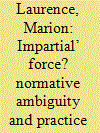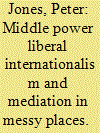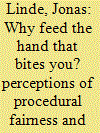| Srl | Item |
| 1 |
ID:
165112


|
|
|
|
|
| Summary/Abstract |
Impartiality is a core legitimating norm for United Nations peace operations. Yet beliefs about what that norm requires of UN personnel have shifted dramatically. In 2013, for example, the Security Council created an intervention brigade – composed of infantry battalions, special forces, and an artillery company – to ‘neutralize’ non-state armed groups in the Democratic Republic of the Congo (DRC). According to critics, these activities violate core peacekeeping norms, including impartiality. This criticism elicits a puzzling response from many UN officials. They downplay the novelty of new practices, insisting that they are still ‘impartial’. Where does this discursive pattern come from, and what does it tell us about the relationship between day-to-day practices and the norms that ostensibly guide UN peace operations? Drawing on evidence from the DRC, I argue that norms like impartiality may endure – and remain rhetorically powerful – without telling us much about how practices on the ground have evolved. Instead, insisting that new practices are impartial can be a way for UN personnel to stabilize a core part of their identity under conditions of normative ambiguity. It can also be a way of glossing over contestation and pre-empting concerns about partiality in UN peace operations.
|
|
|
|
|
|
|
|
|
|
|
|
|
|
|
|
| 2 |
ID:
164370


|
|
|
|
|
| Summary/Abstract |
Canada seeks to increase its role in mediation as part of a renewed liberal internationalist foreign policy. This means confronting the question of how to manage the domestic political consequences of engaging as a mediator with those violating cherished international norms, while also upholding the view that they should be punished. Key to all this is the concept of impartiality, particularly as it relates to the objectives of liberal internationalist countries. This paper explores multiple meanings of the term “impartial” as they pertain to mediation, particularly with respect to the question of mediations involving those who have violated international norms. The paper then explores whether increased support for “arms length” mediations, such as Track Two diplomacy, might allow for more involvement in mediation, while avoiding direct involvement in morally fraught situations. The paper concludes that Track Two can be useful in developing a national capacity for international mediation, and that work can also be done to make Track Two—which is currently based largely on Western concepts—more indigenous. However, support for Track Two does not answer the fundamental question of how Canada, as such, can be more active as a mediator if it is not willing to engage with actors who have committed atrocities.
|
|
|
|
|
|
|
|
|
|
|
|
|
|
|
|
| 3 |
ID:
111908


|
|
|
|
|
| Publication |
2012.
|
| Summary/Abstract |
There is widespread agreement that bad governance and corruption represent daunting threats to new democracies and developing countries. Nonetheless, mainstream research on system support and political legitimacy has to a large extent overlooked the crucial importance of public perceptions of procedural fairness for fostering public support and regime legitimacy. Taking its departure in the theory of procedural fairness, this article challenges the conventional wisdom of earlier research by arguing and demonstrating that public perceptions of procedural fairness and impartiality on behalf of the authorities are the most important determinants of system support in the post-communist European Union Member States. The empirical analysis lends strong support to the fact that perceptions of fairness and the extent of corruption exercise a strong effect on public support for the performance of the political system and approval of regime principles.
|
|
|
|
|
|
|
|
|
|
|
|
|
|
|
|